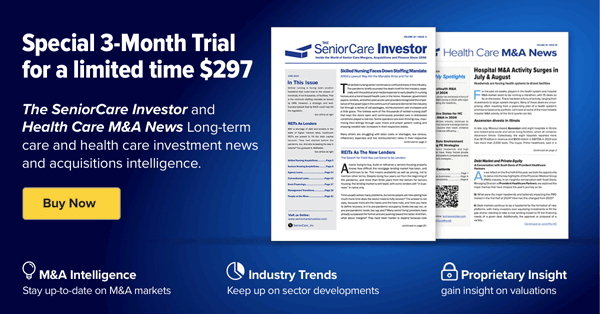Steve Bolen provided encouraging news for attendees at the December 13 New York Healthcare Summit in New York City’s financial district.
“For 2022, health care was among the top targeted sectors for expansion within virtually every one of our capital sources,” said Bolen, the U.S. head of healthcare real estate at LaSalle Investment Management. “For 2023, healthcare real estate is among the top targeted sectors for expansion for our clients.”
Bolen’s confidence hasn’t been shaken by speculation that next year could bring an economic downturn for the United States.
“There’s a growing chorus of economists suggesting that a recession could be a reality in 2023,” Bolen said. “That is a time when I think healthcare real estate really shines. It has historically been a recession-resistant asset class.
“I will put up job growth stats for health care against any other sector of our economy. I don’t know that there’s another sector that, leading up to the pandemic, had 30 years of positive employment growth year after year after year. During the global financial crisis, when the employment market was falling apart, health care had positive employment growth, 2% to 3%. As real estate investors that is very important because when job growth happens, good things happen for landlords.”
Joy Altimare, the chief revenue officer at EHE Health, discussed another trend supporting the strength of healthcare real estate.
“More companies are being private equity-backed or venture capital-backed looking for spaces where they can grow,” Altimare said.
Bolen went on to cite “favorable demographic trends” that support healthcare’s market strength, including the rapid aging of the U.S. population and the fact that senior citizens are living longer.
“We don’t see that changing anytime soon,” Bolen said. “There is an inelastic demand for healthcare services when the economy cycles downward. There is unusual consistency in occupancy rates during good times and bad. That makes it, as real estate investors, predictable. And we like predictability when we’re investing real estate dollars.”
Bullish on the Market
Jonathan Winer, the president of Rethink Healthcare Real Estate, was also bullish on the healthcare real estate market. He was also on the panel titled “Follow the Money: Billions of Dollars Injected Into Healthcare in 2022 – What’s in Store for 2023?”
“The fundamentals in our business have never been better,” Winer said. “If you look at the last five years, the fundamentals for occupancy and rent growth have never been better. This is the place investors want to be in times of economic stress.”
But Winer did identify headwinds the industry will face in 2023.
“There is a general pullback in capital being allocated to real estate,” Winer said. “How that affects the ambulatory sector we will see. Going into next year [there will be] winners and losers. Increasing interest rates have put upward pressure on capitalization rates. People are waiting to see where all that settles out.”
Brent Stackhouse, managing director at Mount Sinai Ventures, told the audience that “decentralizing these large hospital systems is happening across the country,” He mentioned the “tremendous success” of CityMD.
“We hadn’t anticipated it,” Stackhouse said. “It’s convenient. They put up urgent care centers seemingly on every corner. That convenience outweighed those long-standing relationships between patient and provider. We’re still reacting to that experience.
“People are not looking for that family doctor that they’ve been going to for 25 years. They want to know you’re available during lunch.”
Christopher M. Terry, a partner in the real estate group at Kleinberg, Kaplan, Wolff & Cohen P.C. in New York who specializes in acquisitions, development, joint ventures and financing with a focus on healthcare real estate, was the panel moderator. He predicted a 5% to 10% drop in deal volume for 2023 in healthcare real estate.
“There’s hesitancy on the underwriting side for lenders,” Terry said.
He also mentioned competition for deals.
“You have larger investors who have not necessarily been focused on healthcare real estate over the last five to 10 years who see value in terms of its stability,” Terry said.
He mentioned ambulatory care centers when asked what the “hot sectors” will be within healthcare real estate in 2023.
“Patients are less interested in traveling an hour to a major healthcare system, finding their way within that healthcare system, [dealing] with an experience that’s a little more bureaucratic,” he said. “They would much rather be able to go 30 minutes away to a smaller ambulatory surgery center where they see familiar faces, where they know the building. They know what the experience is going to be.”
Terry also acknowledged the underlying strength of the healthcare real estate market.
“I think it is the most likely asset class to remain recession-proof,” he said. “People need health care and people are willing to put health care at the forefront of what they need on a day-to-day basis. Health care is one thing that few can afford to sacrifice. Healthcare real estate is going to remain an attractive option.”


